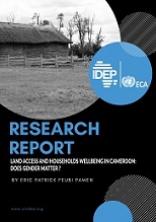IDEP Research Report - Land access and households wellbeing in Cameroon : Dos gender matter? ?

The aim of this paper is to examine the relationship between land access and household wellbeing in Cameroon. We use the multiple component analysis to capture land access determinants and a bivariate probit model to put on evidence effect on wellbeing. With our sample size of 11,391 household’s heads obtained from data of living conditions surveys, our main results show that land access is easier in rural area (72.86%) for female household head than in urban area (29.85%). They are mostly widowed (49.03%), married women in polygamy regime (12.77%) and divorced or separated (10.62%). Those women are uneducated (50.03%) or have fulfilled only primary school (33.66%). They are engaged in informal activities or in the primary sector. They are aged 40-49 years old, have access to financial services and most of them in rural area have poor characteristics of housing. Only about 23.03% of male household heads do not have access to land in rural area with 65.67% of them owning land with no have land certificate and as far as education is concerned, they have just completed primary education (39.66%). They have poor housing characteristics and difficult access to drinkable water and electricity. In urban area, 32.107% of male household head have access to land. They achieved more than secondary school. Regarding their marital status, they are married monogamy or just living together. The latter achieved higher education. Land owner without land certificate (62.45%) are mostly those working as selfemployed or low scale workers. Only 7.53% of male household heads have a land certificate in urban area. In addition, land access has a positive effect on the household wellbeing. In fact, owning land for a household head increases up to 1.86 the probability to be non-poor, than for household where the head does not have access to land. Possessing land in rural area is not a significant guarantee to escape from poverty and give only about 20% of chance to the household head to be non-poor, than a one having access to land in urban area. Households headed by women owning land, regardless the type of document for the ownership, have 13.9% of chance to be non-poor than those headed by a man. Land possession by female- headed households have a relevant impact on the wellbeing of the household as a whole in term of income and consumption. And being landless increases the probability of being poor and vulnerable. Land tenure security and full and equal access of women to property rights and land titles stand like an asset and also as an engine for economic growth that can be engaged in development agenda UN-2030 and AU 2063.